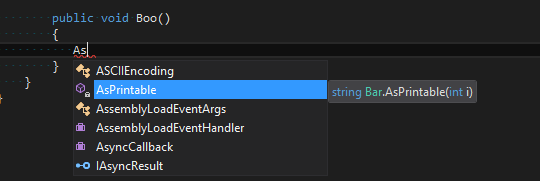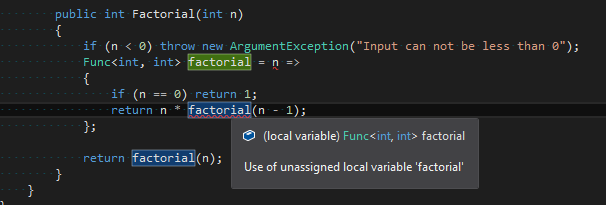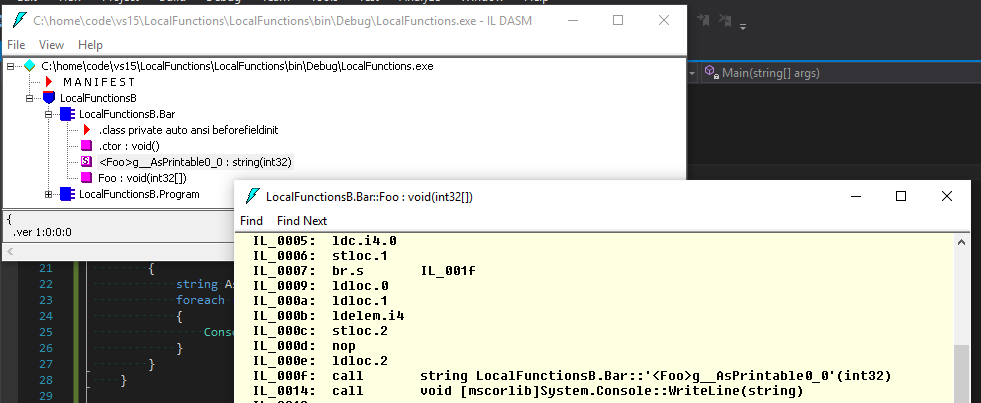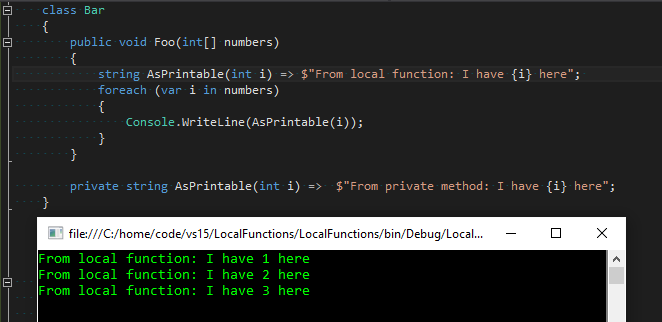Thoughts on C# 7 Local Functions
Published on
Frankly when I first saw that C# 7 will come with new local functions I thought that that’s just a nice and a compact way of defining local helpers. In fact, it’s much more interesting and useful feature. Today I’m going to talk about it in more details.
Let’s start with a brief overview of the current situation.
Current options
Private methods
The first option that existed in C# 1 is having a private method.
class Bar
{
public void Foo(int[] numbers)
{
foreach(var i in numbers)
{
Console.WriteLine(AsPrintable(i));
}
}
private string AsPrintable(int i) => $"I have {i} here";
}
That’s a clean and simple solution. It has few issues, though.
AsPrintable might have no sense outside of Foo method, but it’s accessible for every other method inside the class.
It will be taken into account by IntelliSense.

Func and Action
We can try to hide our helper inside the scope of Foo method by converting it to Func<int, string>:
class Bar
{
public void Foo(int[] numbers)
{
Func<int, string> asPrintable = i => $"I have {i} here";
foreach (var i in numbers)
{
Console.WriteLine(asPrintable(i));
}
}
}
Any disadvantages? Yep, a lot.
The call is unnecessary expensive: it will produce a couple of allocations.
There is no elegant way to define recursive lambda:

We have to use an ugly trick:

And the last, but not least is the fact that lambdas are very limited. You cannot useout, ref,params and optional parameters. They cannot be generic.
There is a bright side, though, a lambda can capture variables from enclosing method aka closure.
Local functions
Local functions can be defined in the body of any method, constructor or property’s getter, and setter.
Since it will be transformed by compiler to regular private static method:

there will be no overhead of calling it and it can have all the properties which regular method declaration can have: it can be asynchronous, it can be generic, it can be dynamic.
Ok, there is a difference. Local functions can not be static. And local functions can capture variables from enclosing block:
class Bar
{
public void Foo(int[] numbers)
{
var length = numbers.Length;
string Length() => $"length is {length}";
Length();
}
}
Useful bits
As Bill Wagner wrote local function is a perfect solution for iterators and asynchronous methods when it comes to parameters validation.
The following code will throw an exception right away and not in a lazy manner.
public IEnumerable<T> AsEnumerable<T>(params T[] items)
{
if (items == null) throw new ArgumentException(nameof(items));
IEnumerable<T2> Enumerate<T2>(T2[] array)
{
foreach(var item in array)
{
yield return item;
}
}
return Enumerate(items);
}
Other observations:
Local functions support Caller Info Attributes
public static void SlimShady()
{
void Hi([CallerMemberName] string name = null)
{
Console.WriteLine($"Hi! My name is {name}");
}
Hi();
}
Fun fact. You can declare a local function with the same name as an existing private method and local function will hide it. Same as for lambdas, though.

Links
- GitHub. Proposal: Nested local functions and type declarations
- Bill Wagner. C# 7 Feature Proposal: Local Functions
- GitHub. Discussion: Local Functions
- MSDN blogs. Know Thine Implicit Allocations.
- MSDN. Caller Information (C# and Visual Basic)